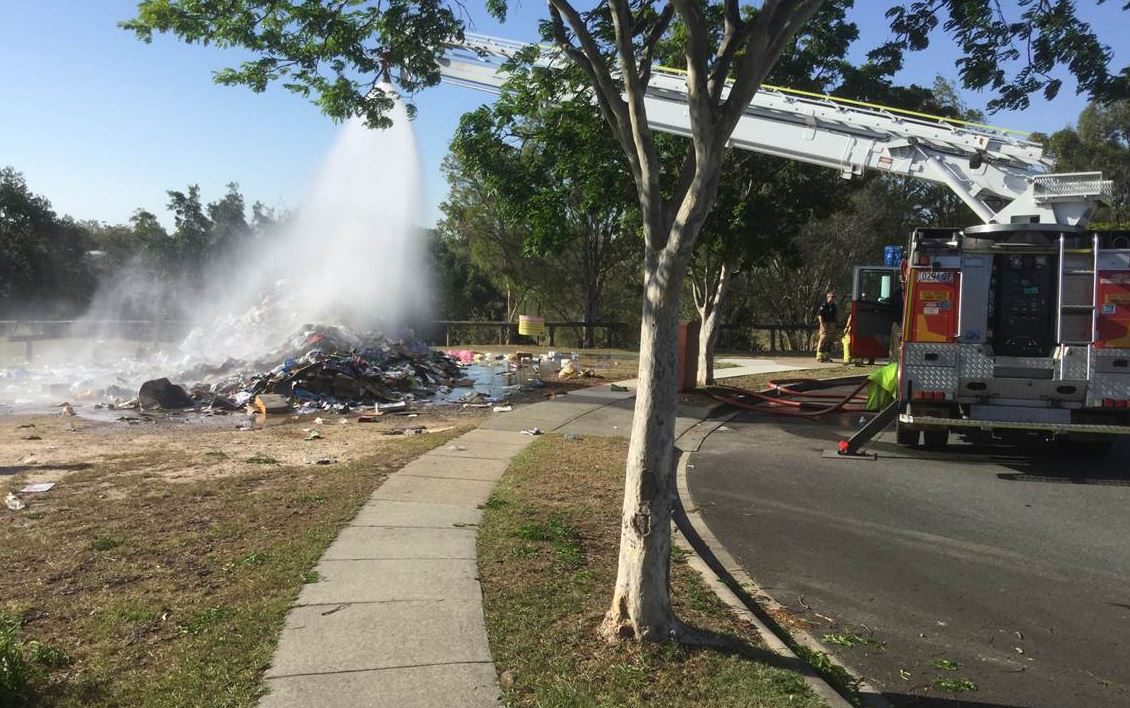
Wrongly binned batteries create fire hazards
Bin batteries create fires so Lord Mayor Adrian Schrinner is warning Brisbane residents to check their bins for ticking time bombs that may unknowingly create dangerous fire risks within the community.
Cr Schrinner said 225 tonnes of batteries were wrongly sent to landfill last year, risking fire danger to homes, rubbish collection trucks and waste and recycling facilities.
“Batteries power our phones, laptops, kids’ toys, cars and essentially make our world go round, but they are putting lives at risk when they aren’t disposed of safely,” he said.
“When we think about the journey our rubbish goes on, from kitchen bin to the street for collection and then to waste facilities, if there’s a battery in the mix, the risk of a fire starting along the way soars.
“So far this financial year, eight Council rubbish trucks have had to dump their loads onto the street because they’ve caught on fire.
“If hot loads are not detected early, they can cause an injury or even death to our drivers and members of the public.
“Two of these life-threatening incidents were confirmed to be caused by batteries but in most cases, the majority of the contents are so badly burnt we can’t find the source.
“At the end of the day, our drivers are well-equipped to handle these situations, but they are easily-preventable by disposing batteries responsibly.”
Visy Recycling Queensland State Operations Manager Gavin Fox said the fire risk did not stop there and once rubbish trucks dropped off general waste at Council’s Resource Recovery Centres, recyclables were transported to his facility.
“All kinds of batteries end up recycle bins and end up at Visy’s Gibson Island recycling facility, but lithium batteries and lead acid car batteries in particular pose the most risk to staff and operations,” Mr Fox said.
“Lithium batteries are the main cause of fires in our processing machines and lead acid batteries expose workers to potential acid burns and injuries.
“Dozens of battery related fire incidents have occurred over the past year and that’s why we stress the importance of disposing batteries responsibly.”
City Standards, Community Health and Safety Chair Kim Marx said residents should treat batteries as hazardous waste and there were many places to get rid of them for free, including Council’s four resource recovery centres.
“Disposing batteries responsibly is easy and you can start by safely storing them in a box or container at home and bringing them with you next time you visit your local resource recovery centre,” she said.
“This includes rechargeable batteries found in power tools and left inside broken toys and laptops, phones and tablets, which should also be taken to your local resource recovery centre.
“You can also take your batteries to a number of other locations around the city including Aldi, Battery World and Officeworks.”
Mr Fox said more than 80,000 tonnes of materials was collected from Brisbane yellow-top recycle bins and sent to Visy for processing, with paper recycled in house and glass turned into bottles at their West End facility.
“Across Queensland, we process around 170 kilo tonnes of recycled material annually and while the volume has stayed stable throughout the pandemic, we’ve definitely seen an increase in glass and small online shopping boxes as well as a decrease in newspapers and magazines,” he said.
For more information about how to safely recycle batteries visit www.brisbane.qld.gov or http://recyclingnearyou.com.au/batteries
For more in about how we are creating a clean , green and sustainable Brisbane, just visit www.vickihoward.com/changingclimate

